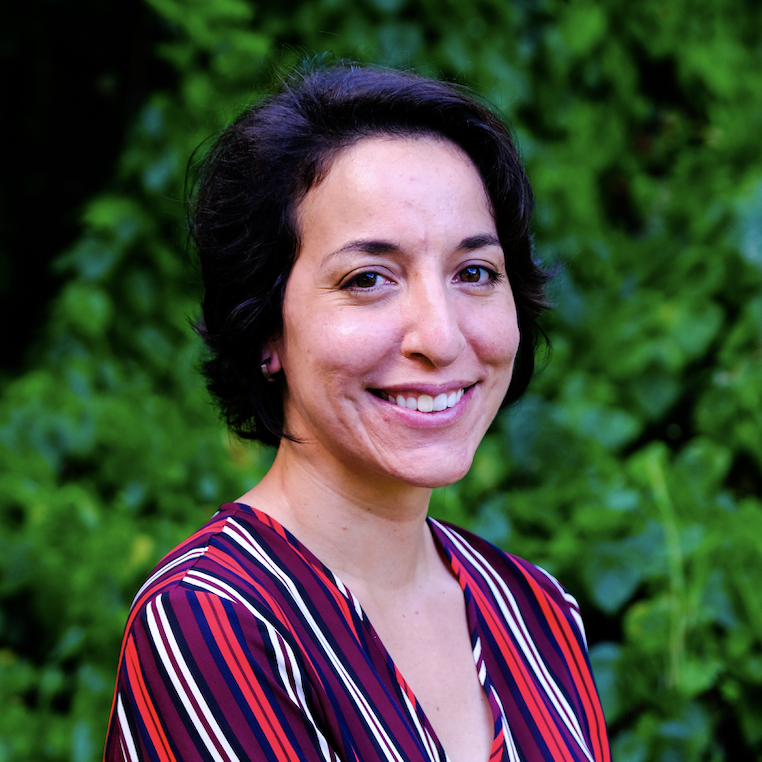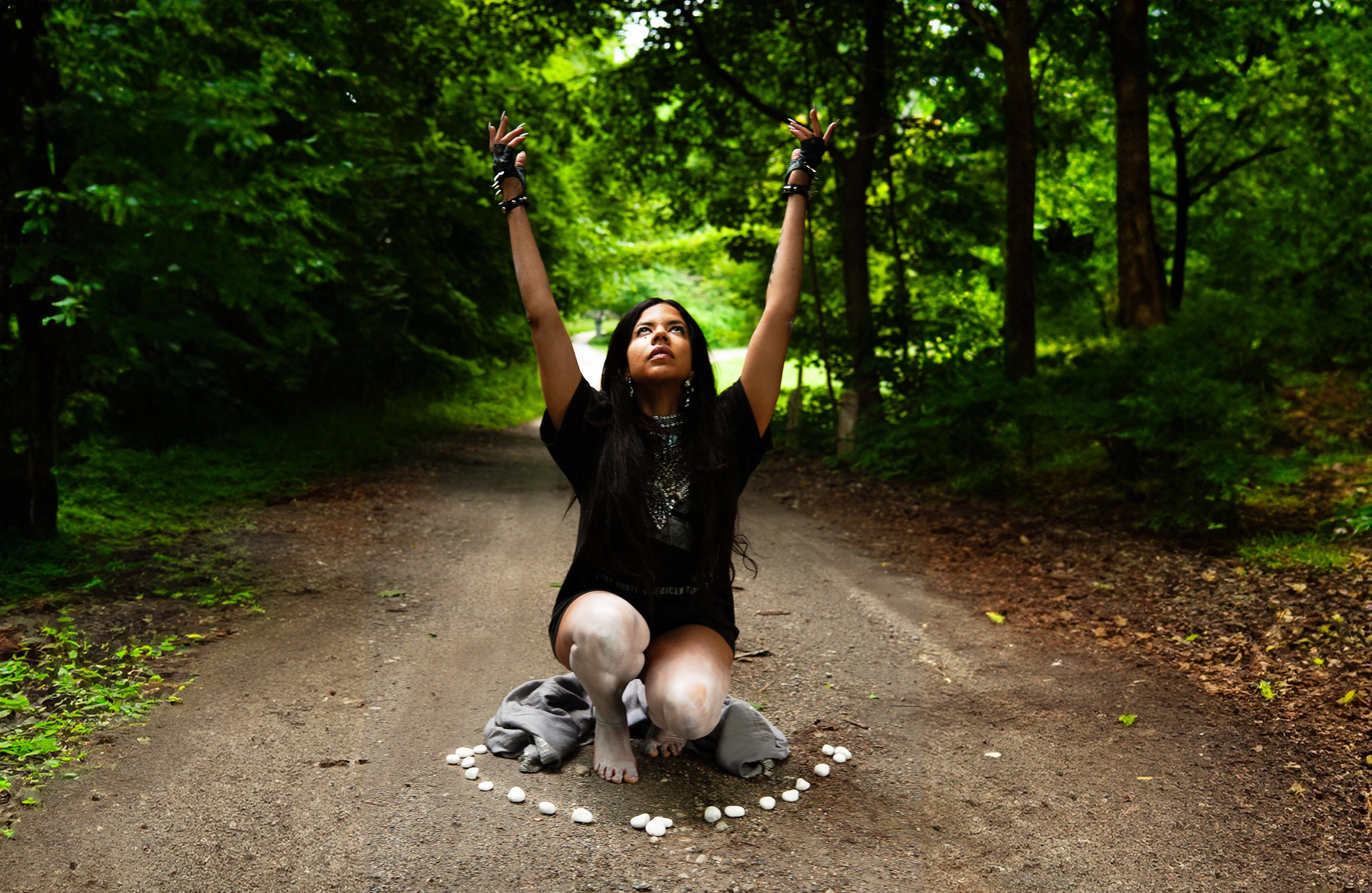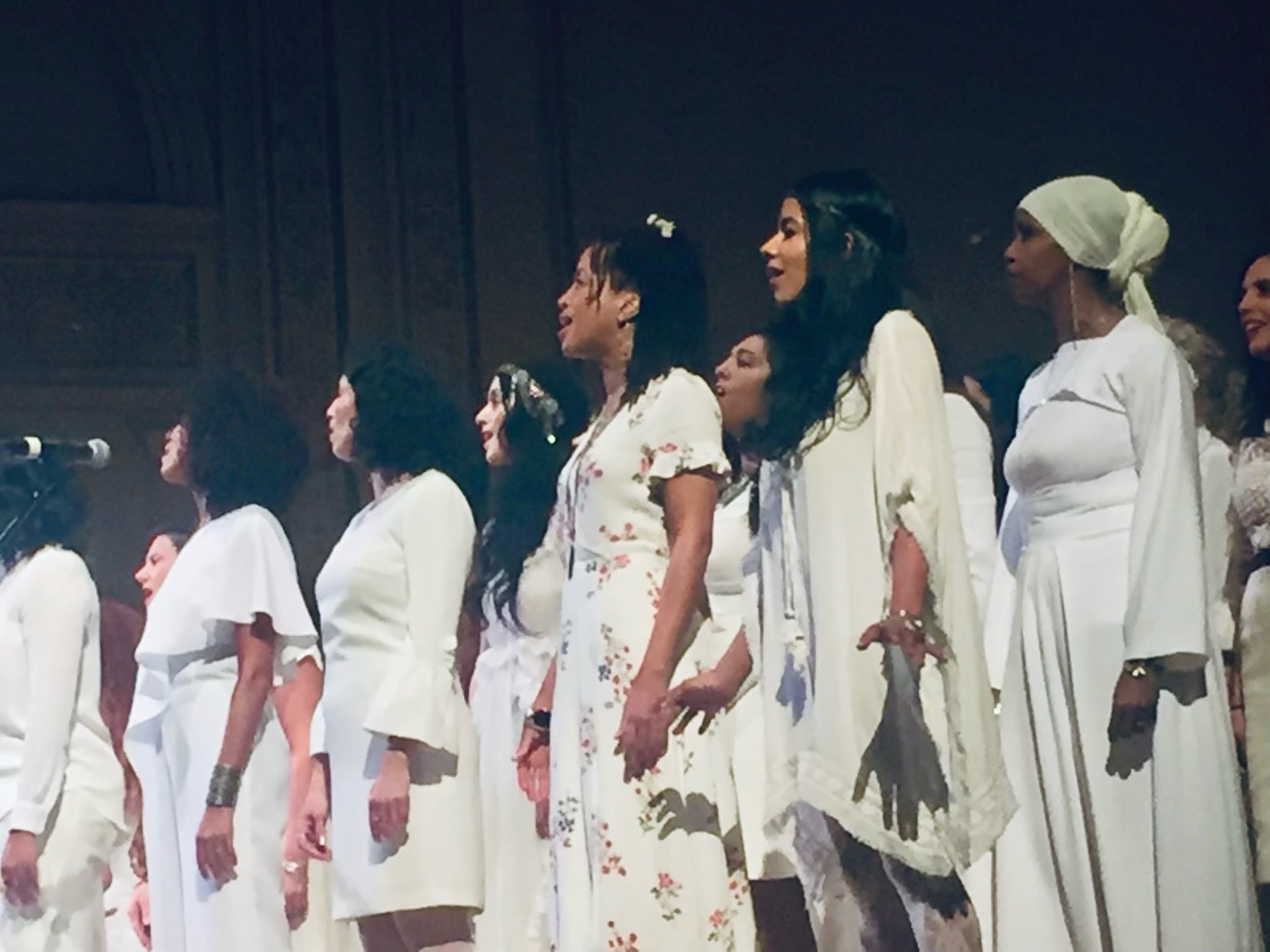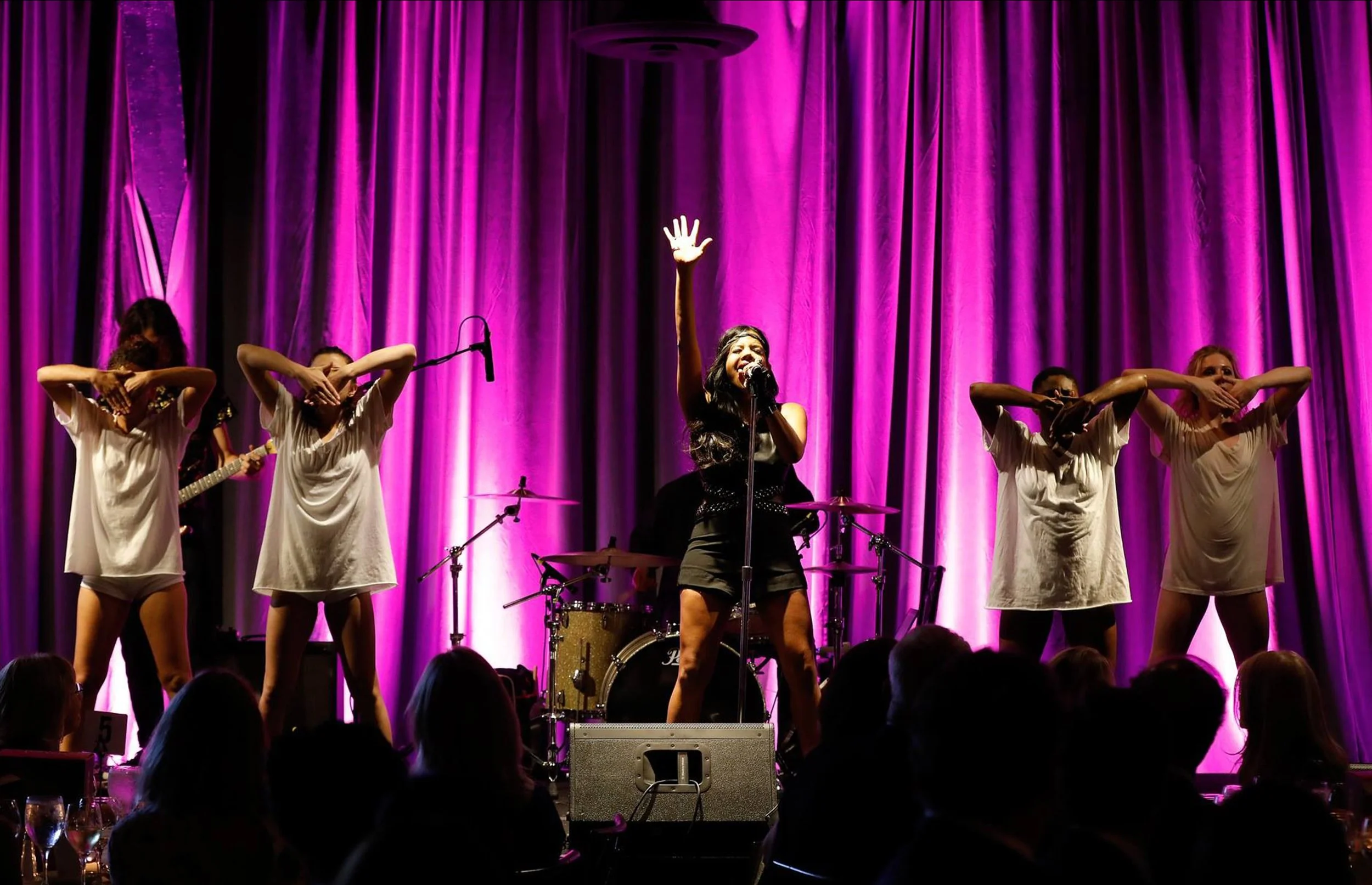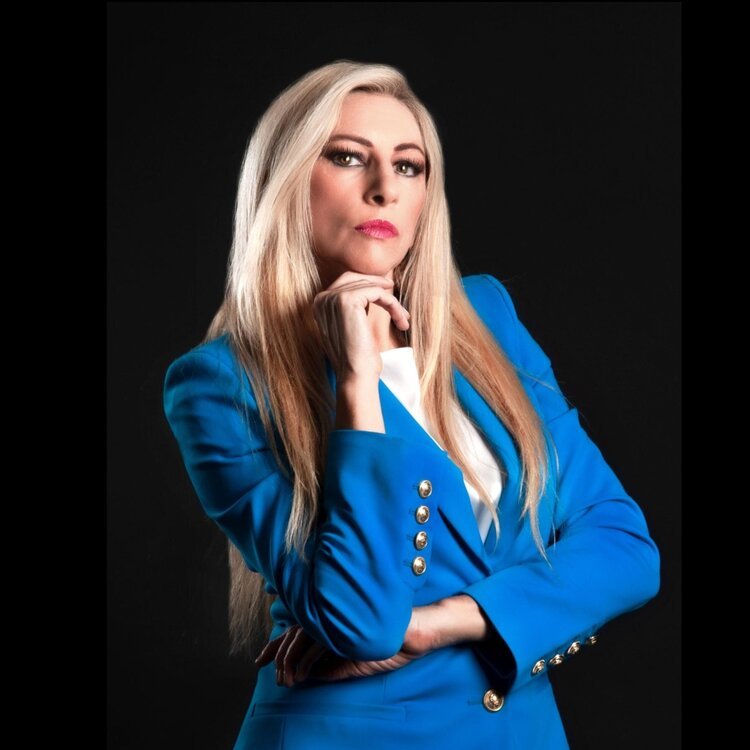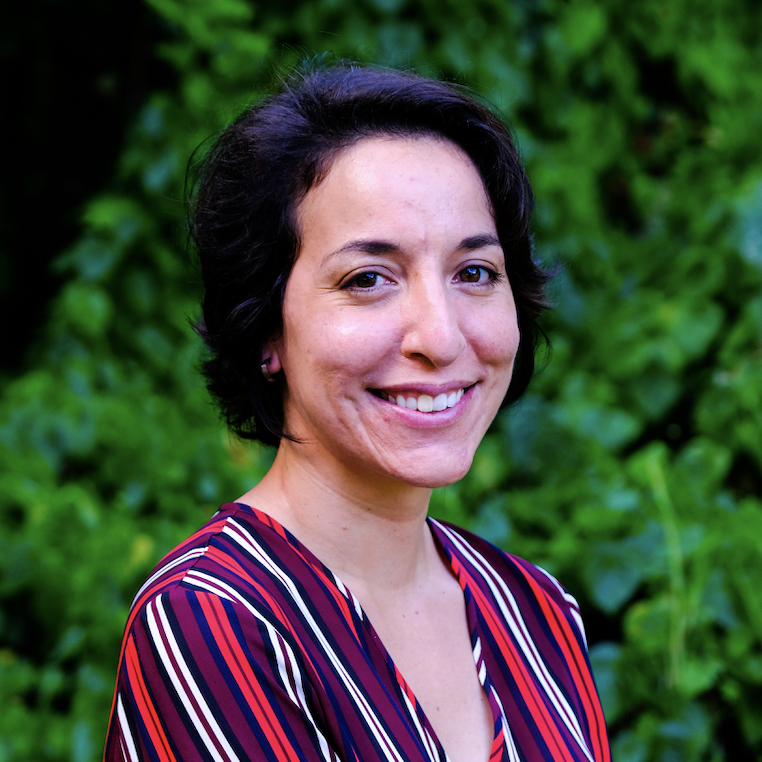Roxiny: “What A Beautiful Way to Scream!”
Singer-songwriter, activist, and sexual abuse survivor Roxiny poses for a photo session during a day of filming a video for two of her songs at Bog Brook Reservoir in upstate New York. After two decades of a career producing music as a healing tool, the artist released her first emotionally charged album “Qoya” in May 2024. Photo by Mariela Murdocco for palabra
Inspired by her personal experience, indie rock artist and activist Roxiny seeks to elevate the healing power of music.
Editor’s note: This article discusses themes of sexual abuse and may contain descriptions or situations that could be triggering to readers. If you or someone you know has been affected by sexual violence help is available 24/7 through the National Sexual Assault Hotline at 1-800-656-HOPE or the online hotline.
Haz clic aquí para leer este reportaje en español.
Her presence is powerful. The moment Roxiny walks into a room, she reigns. Her deep stare exudes confidence and intensity. With her long jet-black hair and a punk rock fashion style, she embraces her individuality, manifesting a rebellious spirit.
In a secluded cottage surrounded by a majestic reservoir and dense woods in upstate New York, the Dominican-born, New York City-based singer-songwriter, born as Roxiny Nicholson and known now simply as Roxiny, was hard at work. Her crew was there to shoot videos for her singles “Rituals” and “Stay.”
The “Rituals” music video features her dressed in gothic glam attire, dancing as if possessed, and looking up while extending her arms toward the sky. The scene evokes a sublime darkness with an ethereal energy.
Her debut album “Qoya” — released in March 2024 — features songs about psychological and sexual abuse, women empowerment, love, hope, equality and the diversity of the immigrant experience. In “9 Months” and “Ni Santas Ni Putas” she protests narcissist destructive relationships and violence against women.
“Ni Santas Ni Putas” was inspired by La Marcha de Las Putas (known as SlutWalk in English), an international protest movement where women and families take to the streets to fight rape and gender-based violence. “The song is an ode to all of us around the world fighting for equal rights and the elimination of violence against women,” said Roxiny. The video features women with names written on their backs of the girls who have gone missing in Latin America due to gender violence.
“9 Months” is about a toxic relationship where Roxiny was psychologically abused and diminished for nine months by a narcissistic boyfriend.
For the filming of the song, “Rituals,” Roxiny explains that she surrenders to the force of nature utilizing rocks that symbolize grounding. “I feel like nature is a rebalancing force. "Rituals’" is a celebration and a reminder of the beauty of our diversity.” Photo by Mariela Murdocco for palabra
“It was a very cathartic experience for me, this past album, because I think I was able to speak about a lot of things that I hadn't found the words to speak about,” she said.
Roxiny’s music and creative endeavors have allowed her to process difficult childhood events that she endured, and which deeply influenced her artistic development as an adult. Now, she’s using her platform to speak up about violence against women, and to leverage the healing power of music in her activism.
As a survivor of childhood sexual abuse, she says she learned to channel her trauma through writing and singing visceral songs.
“It helped me transform something that was so emotionally crippling into a superpower. I was able to heal in many ways through my music. It gave me a place to express that hurt and grow from it, and that same channel gave me the tools to help other girls work through their experiences and traumas.”
Influenced by bands like the Yeah Yeah Yeahs and Suicide, her indie rock style features raw alternative sounds that invoke the new wave and post-punk era of the 1990s, with underground resonances of Bauhaus and Joy Division. A breath of fresh air of dark feminist pop that bewitches with a vibe that stands apart from commercial Latin urban music. Instead, she brings intense percussion and electronic rhythms that dance with her silky melodic piercing vocals.
Her music has been described by Bruno del Granado, head of the global Latin music touring group at Creative Artists Agency, as “groundbreaking,” and her persona as “boundary pushing.” He witnessed her growth and said Roxiny “shatters the pre-conceived notion that female Latin artists have to use sexual seduction to achieve musical success.” When she was around 18 she signed a record deal with Sony — an opportunity any artist would dream of — but walked away from it after the label demanded she develop a more urban music style and a sensual look. “The objective of that deal was to create this kind of reggaeton, sexy girl duo, which is the farthest thing from what I am,” she said. “I was always like a punk rock chick.”
Since then, she has remained true to herself as an independent artist who doesn’t shy away from examining traumatic personal experiences and using them as inspiration and motivation for her art.
The artist, who has a five-year-old daughter, says she began writing songs when she was 15.
“It was liberating,” she said. “It began with my poetry notebooks, where I’d stashed all my feelings for years.”
Roxiny sings the love song, “Stay,” while filming for an upcoming video in upstate New York. The song is inspired by the night she met the love of her life, who is now her husband and the father of their daughter. Photo by Mariela Murdocco for palabra
Born in Santo Domingo, she grew up with her diplomat parents all over the world, though mostly in Spain. When she was around 5 years old in the Dominican Republic, she couldn’t escape the sexual predation of a late-teen family friend who used to babysit her.
“I knew something was off,” she said. “I didn't know how to stop it. He was the older brother of a friend of mine as well. It happened multiple times. When I would go to her house, he would find a way to corner me and do what he wanted to do.”
Roxiny says her abuser threatened that if she told her parents, something bad would happen to her family. So she kept the secret from them for a long time, and it was only after leaving home at around 17 that she was able to more openly talk about what happened to her. Writing songs and making music was part of what helped her begin to heal.
“Getting up on stage and performing all these songs, it's a power that I can't explain,” she assured. “You get up there and you're revisiting, but you're revisiting it from a space of catharsis.”
In the song “Golden Prophet” Roxiny voices her pain, exposing her personal struggles as a survivor. “It was the first time in my life that I found the words to really speak about what happened to me,” she said. “I feel empowered every time I sing ‘Golden Prophet.’”
Roxiny, second from right, performs with the all-female Resistance Revival Chorus in March 2018 at Carnegie Hall in New York City. RRC is a collective of women and non-binary singers who uplift women’s voices and addresses how historically marginalized women have been in the music industry. Photo by Shan Nicholson, courtesy of Roxiny
The Healing Power of Music
Creating music allowed Roxiny to process and speak up about her traumatic experiences. “In many ways it was almost like my therapy,” she said.
She remembers that — as a girl — she was very angry and ashamed for many years about what happened, and blamed herself for the abuse. “I had a really hard time making sense of who I should tell, how I could work through this.”
During a sexual education class in high school, she learned the definition of sexual abuse, and talked to a friend about her trauma for the first time. “Somehow it all came out in conversation. I realized, oh, you're not the only person that has happened to.”
Almost a decade later in 2017, while in Los Angeles working in-studio with music producer Chris Cody, she had an important breakthrough. “He gave me this amazing space and left me in a room with a beat and a microphone and let me be. Here I was given this stage and this space to be able to just open up and say what I wanted to say.” Her song “Golden Prophet” was born. In that moment the potential of music as an emotional release tool beyond being a creative tool became undeniable.
“Music to me has always been something that no matter what I'm going through, once I'm able to find those words, it just feels like a cleansing.”
Music can be a healing and calming tool, and it can also be used to help improve mental health and wellbeing, achieve goals, and overcome challenges. Sandra Ramos-Watt is a licensed creative arts therapist and an adjunct professor at New York University’s Department of Music and Performing Arts Professions who works with Latino patients who have suffered abuse and have language barriers. She says that music can give people a sense of having mastery over something, rather than having traumatic experiences limit or control them.
“It (making music) frees the person from the imprisoning aspects of the experience,” Ramos-Watt emphasized. It gives people an opportunity to say, “I'm not going to let this experience ruin and limit me. I'm going to use it in the service of creativity,” she adds.
For individuals who have endured abuse in silence, or did not feel safe coming forward — as is the case of many survivors — this can feel particularly empowering. Ramos-Watt explained that putting the trauma out in the public can help validate the experience. “So you gain control over the experience by putting it into concrete form, by naming it.”
As a survivor and an activist and no longer a victim, Roxiny helps children and women overcome trauma through songwriting workshops. She is shown here filming the video for her upcoming song, “Stay.” She says she chose to film in the water because “it is a beautiful element and conduit that flows like love in its purest form.” Photo by Mariela Murdocco for palabra
“What a beautiful way to scream,” recalled Roxiny. “You can yell, which is what happens to me when I get onstage. I transform, and all this just comes out, and that's a really powerful thing to be able to do.”
Support the voices of independent journalists.Until Dec. 31, your donations will be matched dollar-for-dollar. 
|
Dr. Kenneth Aigen, professor and director of Music Therapy at NYU’s Steinhardt School of Culture, Education and Human Development, says that music can help people express repressed memories and difficult emotions. “Music can function as a container. Someone writes a song, and now there's an artistic product. It's out there, and it gives a person a sense of control when the problematic memories or feelings are used to create something.”
Dr. Aigen makes the distinction that it’s not just about expressing repressed trauma — as this may not always be beneficial. “Sometimes what music therapy can do is not necessarily have the person re-experience the trauma, but just build a new and healthier and stronger self that emerges from the damaged self that the trauma inflicted,” he added.
Both therapists emphasize the singing, and using one’s body as a musical instrument can be very empowering. “(It helps) just being grounded and connected to your diaphragm, connected to your breath, to your body. A lot of times with trauma, you are not connected, you disassociate, you go somewhere else; you go outside of the body,” Ramos-Watt said. “So it pulls the person back into the body. The body image then becomes more positive,” Dr. Aigen added.
Roxiny has a powerful spiritual presence that is manifested through her voice, her empowering messages and her movements when she dances. Photo by Mariela Murdocco for palabra
Music as advocacy
“Music was my saving grace. Writing music was my saving grace,” said Roxiny. “And then, once I felt that I had gotten to a place where I felt comfortable speaking about it, not ashamed, not feeling all of these other emotions that came initially, I knew that I was in a position that I could help other girls.”
Music has been like medicine for the artist. “Cause sometimes, when you've been through these experiences, you just want to scream,” she said, adding that, “Music is one of those things … it's not tangible, but it has so much power.” As a dedicated women’s rights activist, she’s harnessing that power for her advocacy around sexual abuse.
“I feel like my fight is just a fight of bringing us up to a place where we're all equal,” she said.
In the United States, at least one in four girls and one in 20 boys experience sexual abuse, according to the Centers for Disease Control. Based on a 2022 report by the U.S. Department of Health & Human Services Administration for Children and Families, among maltreatment cases where the victim was known to be a Hispanic child, 10.5% were cases of sexual abuse. Globally, an estimated 736 million women — almost one in three — have been subjected to “physical and/or sexual intimate partner violence, non-partner sexual violence, or both at least once in their life,” according to UN Women.
Roxiny collaborates with several organizations by performing at awareness-raising events — like at the recent United Nations Women’s Future Feminist Festival — and conducting workshops that leverage the healing power of music to support women and children who have suffered abuse. Roxiny mentions that some of her recent collaborators include The Center, Road Recovery, Latinas y Líderes and GEMS — an organization that serves domestic sex trafficking victims and survivors.
Roxiny performing during the annual fundraiser gala for GEMS in New York City in 2017. Photo by Shan Nicholson, courtesy of Roxiny
“The reason I continue to do these music workshops is because I have seen the power of music first-hand,” she said. “I actually have an experience with one particular person that walked into the first session shaking, unable, just completely closed. By two or three meetings later, they would come in and open up a little bit more. By the third one, they end up belting out the first thing that comes into their mind. And this opening just happened! I was like, Oh my God, this is … it’s this power!”
Speaking openly about sexual abuse can be incredibly difficult for survivors like her, but when she was finally ready, she felt she had a responsibility to do so, as an advocate and as a musician.
“I had to really make a decision for myself and for a lot of girls who I feel like maybe are in my same position,” Roxiny assured. “I just made it my point to really make this a public statement and make it something that I got behind.”
“Rituals” — Roxiny’s latest collaboration with Grammy-award producer Little Shalimar about diversity, individuality, and union in the United States — comes out in October in celebration of Hispanic Heritage Month. Next spring, Roxiny plans to go on tour at several Northeast colleges and universities in collaboration with women’s rights organizations, and she will be participating this fall at the UN’s International Day for the Elimination of Violence Against Women.
Roxiny in New York City filming the video for the song “Rituals,” with performers from different ethnicities. “We have all come here with our own diverse cultures and rituals. In this place, we are one. We deserve to take space as part of the tapestry of America,” she said. Photo by Mariela Murdocco for palabra
—
Mariela Murdocco, a five-time Emmy Award nominee, is a bilingual multimedia journalist and photographer based in New York. She has worked as a reporter, TV producer, anchor, photographer and videographer for Consumer Reports, Telemundo, News 12, The New York Daily News, Banda Oriental, The Jersey Journal and The Associated Press. She was a TV correspondent for Canal 7 in Uruguay and has contributed to The Guardian, The Huffington Post, Hola TV and Fox News. Born in Uruguay, Murdocco is currently a reporter and photographer for palabra, a multimedia online platform of the National Association of Hispanic Journalists (NAHJ). In 2023 she made her debut as an audio reporter and producer for Así Fue, a podcast series initiative of palabra and NAHJ. In 2012 she was elected NAHJ’s national Spanish at-large officer. Her dual career includes Mariela M Photography where she specializes in corporate and family portraiture. @marielamur
Virginia Lora is an independent audio producer, reporter, and editor who works in English and Spanish, and dabbles in French. Born in Peru, she moved to the U.S. at age 13 and grew up in Miami. Much of her interest in stories that center the margins comes from her early-career experiences interviewing people in communities all over the country for an oral history project, and her own immigration experience. She earned a B.A. in history, and French, and a certificate in Latin American and Latino studies from Amherst College, and trained in narrative audio at the Transom Story Workshop. @VirginiaLoraC



